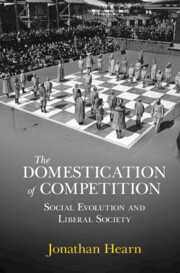Book contents
- The Domestication of Competition
- The Domestication of Competition
- Copyright page
- Contents
- Figures and Tables
- Acknowledgements
- Introduction
- Part I The Ideas
- Part II The Analytic Narrative
- 3 The Decline of Traditional Authority and the Rise of Corporate Actors
- 4 From Militias to Militaries
- 5 From Adventurers to Companies
- 6 From Factions to Parties
- 7 From Churches to Universities
- Part III The Wider View
- Conclusion
- References
- Index
3 - The Decline of Traditional Authority and the Rise of Corporate Actors
from Part II - The Analytic Narrative
Published online by Cambridge University Press: 26 January 2023
- The Domestication of Competition
- The Domestication of Competition
- Copyright page
- Contents
- Figures and Tables
- Acknowledgements
- Introduction
- Part I The Ideas
- Part II The Analytic Narrative
- 3 The Decline of Traditional Authority and the Rise of Corporate Actors
- 4 From Militias to Militaries
- 5 From Adventurers to Companies
- 6 From Factions to Parties
- 7 From Churches to Universities
- Part III The Wider View
- Conclusion
- References
- Index
Summary
Chapter 3 provides the key historical antecedents for Chapters 4-7, focusing on changes in the domains of kinship, religion, and law. It examines the decline of traditional authority in medieval Europe, specifically the weakening of inherited monarchical and aristocratic rule, and of the Church and associated belief in supernatural beings. At the same time, the power of state-based law was consolidating and expanding, developing new ideas of ‘legal persons’, as ‘fictions of law’, that would become crucial to the creation of new corporate actors and the domestication of competition. This shift combined with intensifying trans-Atlantic competition among European empires, and novel experiments in republican and democratic government in America and France, created a new context for the development of law and competition.
Keywords
- Type
- Chapter
- Information
- The Domestication of CompetitionSocial Evolution and Liberal Society, pp. 77 - 108Publisher: Cambridge University PressPrint publication year: 2023

